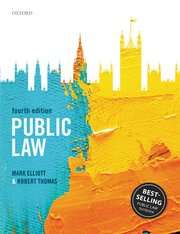Review: Textbook as tool, nutrition and weapon

Christopher Stanley, litigation consultant at Belfast-based KRW LAW LLP, reviews a new textbook on public law.
As an English lawyer practising in Ireland – north and south – on a range of issues including the legacy of the conflict and the mother and baby homes scandal, to ask to review an English textbook on public law may appear a somewhat odd choice.
I work in a legal environment which is determined by its devolved status and its cross-border relations. My view from The Narrow Ground upon The Village of Westminster determines my understanding of English public law.
I wanted to review a textbook on public law because, having been neglectful in my studies of the subject as an undergraduate, I want to make up for lost time.
To do so now seems an imperative because of what some describe as a ‘constitutional crisis’ in the UK (incorporating Great Britain and Northern Ireland – first stop in constitutional confusion). If there is a crisis, an understanding of the fundamentals of public law might help me understand why and with what effect.
Constitutional reforms in the last 20 years (including devolution) are now being shaped by political and natural forces, specifically Brexit and the response of ‘the state’ to Covid-19.
The most recent general election in the UK has led to an elective dictatorship (a political majority intent on delivering the promises of its manifesto), assisted by the coronavirus pandemic crisis which has enabled a seismic shift in what was traditionally framed as the (Whig) separation of powers doctrine, the checks and balances of scrutiny and accountability between government, parliament and judiciary.
It is Downing Street and the Cabinet Office which determines the nature/science of government in the UK, Whitehall being neutered, Parliament being silenced and the judiciary being attacked.
The divisions within the UK have become intensified through the period of the pandemic, between north and south, between Scotland and Northern Ireland, between the UK and Europe, between Oxford and Cambridge.
I mention Oxbridge because one of the co-authors of Public Law is professor of public law at Cambridge (his colleague being professor of public law at the northern powerhouse that is the University of Manchester), whilst in Oxford, Professor Richard Elkins is professor of law and constitutional government. Elkins is also head of the Judicial Power Project at the right-wing think-tank Policy Exchange, which is a powerful ‘influencer’ upon Downing Street thinking on constitutional matters and the nature/science of government.
The substance of Public Law, of course, does not reflect any ideological position (save that public law is an ideological construct – a political practice – how power is allocated) but it does present the tensions within public law in the UK regarding matters such as the separation of powers, Brexit, the devolved settlement, constitutional conventions and good governance (scrutiny, accountability and transparency – specifically of executive power framed as prerogative). It also presents accessible accounts of two points of contest within the perceived/manufactured ‘constitutional crisis’ – judicial review and human rights.
As the authors note in their preface: “To the student attempting to get to grips with UK public law, the speed and frequency with which substantial elements of the constitution change may seem bewildering and disorientating, and such phenomena can certainly be an obstacle to understanding. In writing this new edition, we have attempted to guard against that risk.
“In doing so, we have not sought to disguise the significance of complexity of the changes that the UK’s constitutional arrangements have undergone in recent years and will undergo in the years to come. However, we have attempted to examine such developments in a way that is grounded in a clear exposition of the fundamental, and more enduring, elements of the constitutional order.”
The authors of Public Law deliver on this attempt brilliantly. They succeed by way of form of the book. The law textbook, if this is a contemporary exemplar, has undergone a quiet revolution in the years intervening from my graduation.
First, it is available as an enhanced ebook. Second, it has the benefits of reflecting other voices beyond those of the authors as each chapter has a brief from expert commentators enabling an insight into academic debate. Third, the authors pose questions throughout and provide online self-testing in addition to online discussion. Fourth, case examples are provided to assist in further understanding. Fifth, there are diagrams to make sense of complex topics and reading lists to further elucidate the same. This ‘project’ goes beyond a text book and becomes a working tool.
As a practitioner working in public law, this accessible text is a pleasure to engage with, as it provides nutrition to thinking and an instrument to use in developing my understanding on the complexities of the subject – and a weapon to counter pernicious narratives which seek to restrict the good governance of public law in order to secure short-term political gain for overarching executive prerogative powers.
Public Law (Fourth Edition) by Mark Elliott and Robert Thomas. Published by Oxford University Press, (£39.00 Paperback) 935pp.










